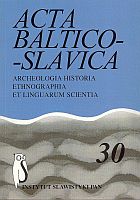Der Genitiv Des Agens / Experiencers In Litauischen Und Russischen Dialekten
The Genitive of the Agent and Experiencer in Lithuanian and Russian Dialects
Author(s): Tobias Privitelli, Markus RodunerSubject(s): Language and Literature Studies
Published by: Instytut Slawistyki Polskiej Akademii Nauk
Keywords: the Genitive of the Agent and Experiencer; Lithuanian dialects; Russian dialects
Summary/Abstract: This paper deals with Lithuanian and north western Russian syntactic constructions which consist of an agent in the genitive and a past passive participle as predicate, the latter often combined with a patient in the nominative, for example: Lithuanian: Visos mūsų namų durys tik jo padaryta. all our house door.NOM only he.GEN make.PPP.N.SG “He's made all doors of our house on his own.” NW-Russian: Cломала ногу, так меня нога сломано. break leg like this I.GEN leg.NOM break.PPP.N.SG “I've broken my leg, I've broken my leg like this.” The authors discuss the typology of such sentences on the basis of dialectal recordings collected by them on several expeditions to Lithuania and north western Russia. For a diachronic explanation they consider Schmalstieg's interpretation of the phrase as a reflex of an Indoeuropean ergative construction, as well as Holvoet's hypothesis of its adnominal origin. In contrast to them, the authors point to the impersonal trait of the construction, which is underlined by the fact that its neuter participial predicate, in general, doesn't agree with the nominative object. It can be seen as an analogy to impersonal Baltic Finnic expressions in which a formally passive participle attained an impersonal meaning. In the Lithuanian examples possessive pronouns (such as mano, tavo) appear as agents, rather than the expected personal pronouns in the genitive (like manęs, tavęs etc.). This gives evidence of the „possessivity“ of the phrase. The Russian evidence differs from the Lithuanian one, inasmuch as it shows different types of non-agreement, and agents with and without preposition. On the other hand, many Lithuanian examples may be interpreted as evidentialis, a trait almost unknown to the Russian phrases. However, the constructions of both dialect groups share a possessive, perfect and resultative semantic.
Journal: Acta Baltico Slavica
- Issue Year: 2006
- Issue No: 30
- Page Range: 403-425
- Page Count: 23
- Language: German

